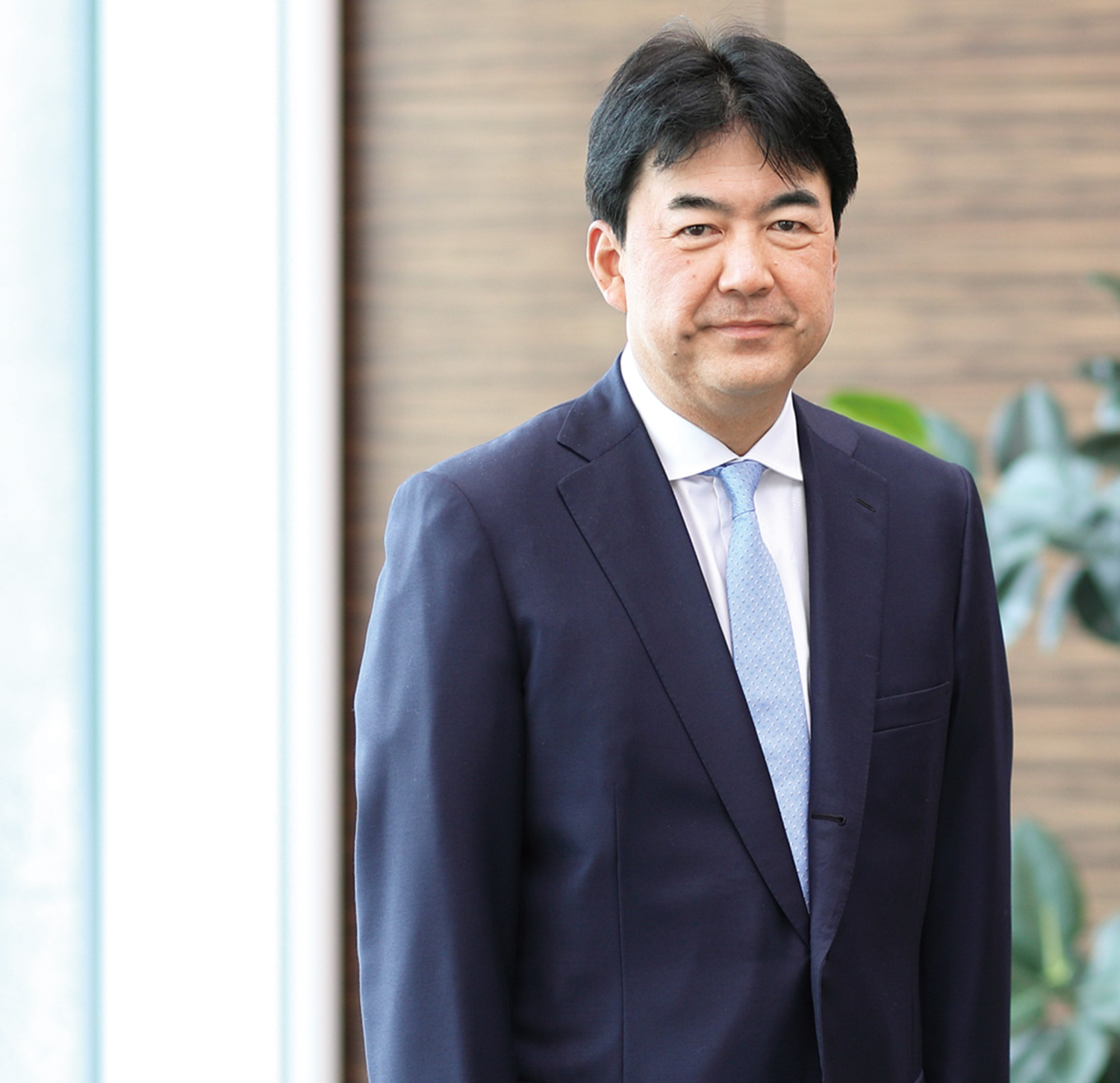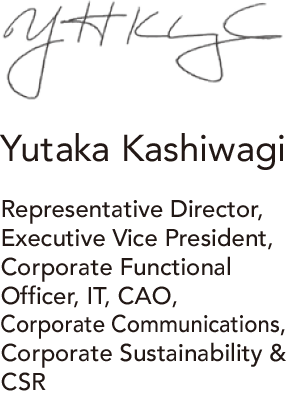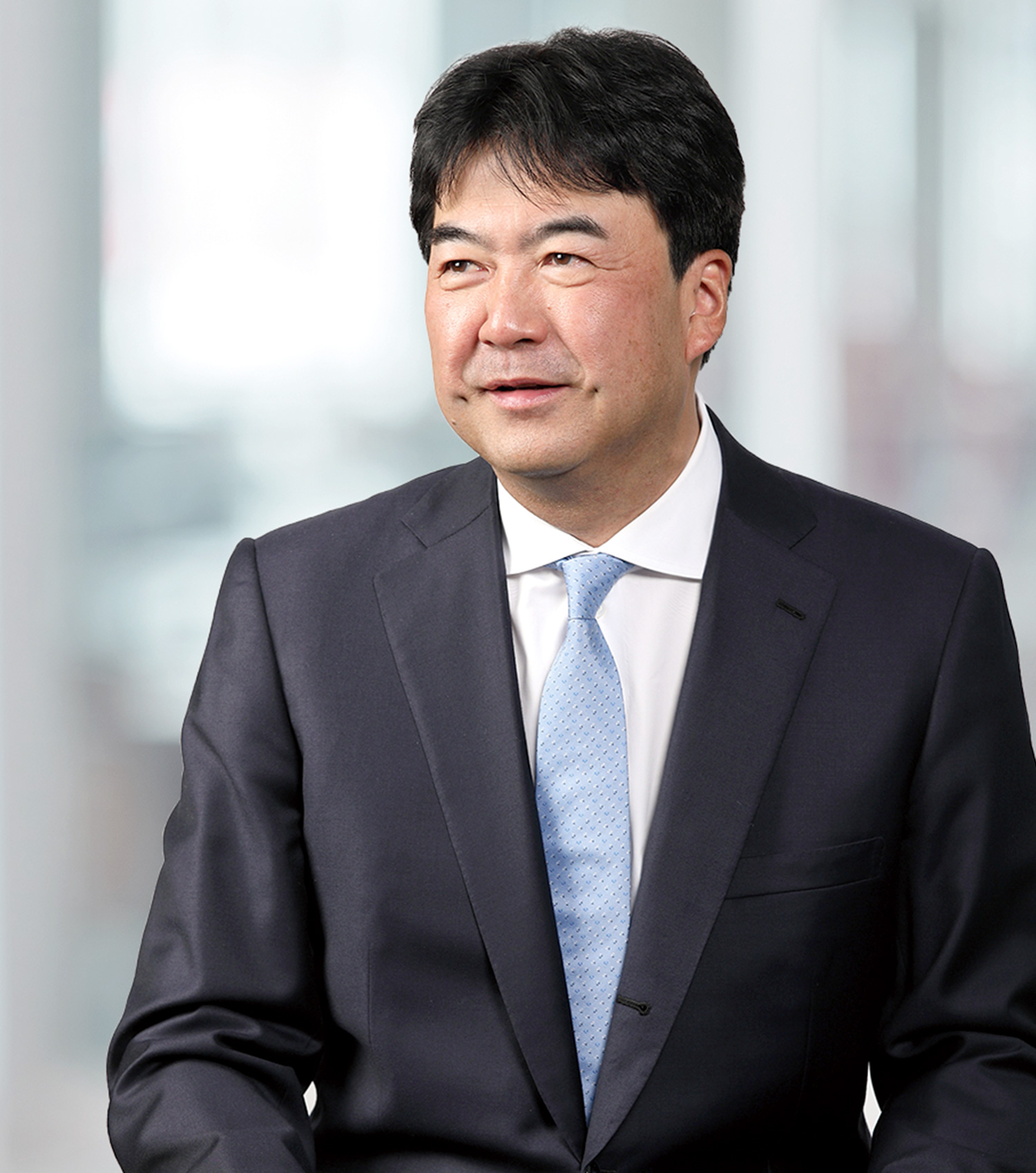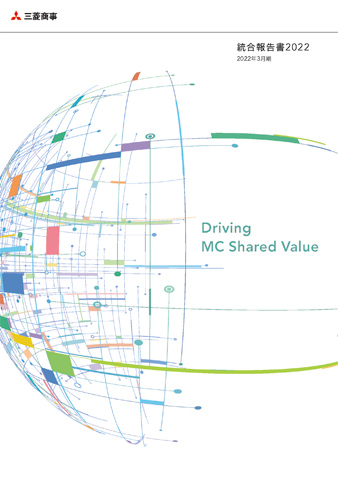Integrated Report 2022PDF List
Index
-
【Introduction】 (PDF:2.2MB)
Index/Editorial Policy/Corporate Philosophy/Message from the President and CEO (PDF:985KB)/Midterm Corporate Strategy 2024/Special Feature Creating a New Future(Fostering New Industries/Regional Revitalization)/Review of Midterm Corporate Strategy 2021
-
【The Value Creation Story】 (PDF:3MB)
Path of Value Creation/Value Creation Process/The Six Capitals/Focus Human Capital—The Source of Value Creation/Materiality/Focus Climate Change—Materiality Forming the Basis of EX Strategy/Message from the CAO (Chief Administrative Officer)/Message from the CFO
-
【Value Creation by the Business Groups】 (PDF:2.7MB)
Business Groups at a Glance/Business Groups × Business Models
-
【Initiatives and Systems Supporting Sustainable Value Creation】 (PDF:2.8MB)
Sustainability Promotion Framework/Risk Management/Corporate Governance
-
【Data Section】 (PDF:2MB)
Directors and Audit & Supervisory Board Members/Executive Officers/Shareholder Information/Organizational Structure/Global Network(Countries and Regions)/Balance of Risk Money Outstanding in 13 Countries/Financial Highlights/Equity in Earnings of Subsidiaries and Affiliates/ESG Data/Corporate Information



Message from the CAO (Chief Administrative Officer)
We will implement initiatives
based on our redefined
Materiality to maintain and
enhance our corporate value
over the medium to long term.

As societal challenges that need to be addressed such as climate change and human rights issues become increasingly diverse and complex, it is essential for companies to address these issues through their core business activities. In response to drastic changes in the external environment, policies, laws, and regulations are being developed, international initiatives are being created, and the flow of private-sector funds and the behavior of investors are undergoing major changes. Specifically, in addition to addressing climate change, we are now in an era in which non-financial initiatives have a significant impact on corporate value, such as whether a governance structure is set in place to respond to a rapidly changing business environment and whether employees, who are responsible for maintaining and improving competitiveness, are provided with appropriate training. We believe that insufficient commitment to sustainability is detrimental to a company, while the active pursuit of sustainability is essential for mid- to long-term growth. In addition, damage to ecosystem services and the natural environment, which are prerequisites for a company’s existence, will directly affect company operations and indirectly affect its supply chain, posing a significant risk to the company. Therefore, we believe that working to address societal challenges constitutes both risk management as well as the pursuit of business opportunities.
Initiatives Based on Materiality(Management)
Based on our corporate philosophy, The Three Corporate Principles, we have been promoting our sustainability efforts by setting forth our commitment to creating sustainable corporate value in Midterm Corporate Strategy 2012, and simultaneously generating economic, societal, and environmental value in Midterm Corporate Strategy 2018. Also, in 2016 we identified our Key Sustainability Issues that must be proactively addressed to ensure sustainable growth. Meanwhile, six years have passed since the formulation of our Key Sustainability Issues, and expectations for companies, including measures to address climate change, have increased, while the societal challenges to be addressed have also changed. Midterm Corporate Strategy 2024, announced in May of this year, aims for the continuous creation of significant shared value, or “MCSV” in order to address societal challenges. In line with this, we have redefined our Key Sustainability Issues as eight material issues (Materiality) , a set of crucial societal issues that we will prioritize through our business activities. This redefinition focused on three points: fulfilling our responsibility to provide a stable supply of energy to support the transition to a decarbonized society; promoting businesses that respect human rights as a company that helps to enrich society; and providing a solid foundation, including human resource and organizational development as the bedrock of these efforts.
Among the initiatives based on our Materiality, I will address in detail the following: (1)Contributing to Decarbonized Societies, (2)Addressing Regional Issues and Growing Together with Local Communities, and (3)Fostering Vibrant Workplaces that Maximize the Potential of a Diverse Workforce as representative examples.
1.
Contributing to Decarbonized Societies
(related capital: environmental and natural capital)
MC has identified “Contributing to Decarbonized Societies” as a material issue for realizing a carbon neutral society. In October 2021, in our “Roadmap to a Carbon Neutral Society,” we have formulated mediumand long-term GHG emissions reduction targets aligned with the Paris Agreement: to halve emissions by FY2030 (FY2020 baseline) and to achieve net-zero emissions by 2050. In addition, in the Midterm Corporate Strategy 2024, we also laid out a range of measures toward achieving international objectives, such as those of the Sustainable Development Goals (SDGs) and the Paris Agreement, while fulfilling our mandate to meet the demand for energy. Under the MC Climate Taxonomy concept, each of our businesses is classified based on climate-related transition risks and opportunities, and in accordance with such classification, the following four mechanisms are implemented: 1.5°C scenario analysis, Transform Discussion, Investment Planning in accordance with GHG Reduction Plans, and the Evaluation of New Investment Using Assumptions Under Decarbonization Scenario. By promoting these mechanisms, we aim to contribute to the realization of decarbonized societies through the steady decarbonization and strengthening resilience of our business portfolio and advancing EX (energy transformation) on a global scale.
In addition, since the realization of a carbon neutral society requires GHG reductions not only by MC but throughout the value chain as well, we are committed to becoming a decarbonization solution provider by understanding the emissions reduction needs of industries, consumers, and communities. We will also continue to diligently consider the calculation and disclosure of our Scope 3 emissions (Category 11 (use of sold products), which accounts for the majority of our Scope 3 emissions), which investors and other stakeholders are increasingly requesting us to disclose.
2. Addressing Regional Issues and Growing Together with Local Communities(related capital: social capital)
Based on the recognition that building relationships with communities is essential for the successful execution of our business, we have also identified “Addressing Regional Issues and Growing Together with Local Communities” as another of our material issues. In addressing this issue, we conduct our business based on relationships of trust with diverse stakeholders, regions, and communities. Specifically, we strive to minimize negative impacts on local communities, including respecting the rights of indigenous peoples, in addition to sharing prosperity together with local communities through job creation, promoting community development, and procuring materials from local communities through our business.
3. Fostering Vibrant Workplaces That Maximize the Potential of a Diverse Workforce(related capital: human capital)
MC has achieved sustainable growth together with society through its business by anticipating the needs of the times and actively taking on the challenge of addressing societal challenges as a player in individual businesses and the industries built from them. What has supported this growth are human resources with high aspirations for addressing societal challenges, foresight to anticipate the times and derive new value, execution skills to quickly materialize concepts by involving stakeholders beyond national and industry boundaries, and high moral and ethical standards based on the spirit of the Three Corporate Principles. Our human resources have created value by conceiving and executing optimal solutions for a wide range of social, industrial, and customer issues from a proactive and global perspective. MC therefore views human resources as a source of value creation, or human capital, and has been and will continue to actively invest in them.
In order to continue creating the MCSV that we strive for, MC must continue to be a dynamic, spirited and vibrant organization with a diverse range of human resources, with diverse values and backgrounds, as well as a diverse range of experiences and abilities from many industries that meet with each other through organic connections. Therefore, we have defined one of our material issues as “Fostering Vibrant Workplaces That Maximize the Potential of a Diverse Workforce,” and have established the three pillars that constitute our human resource policies: HR Strategy, Strengthen Engagement, and Data Utilization.
Human Resource Strategy
In an environment where single events can spread and influence each other instantly around the world, it is important for us to be a flexible organization that can respond immediately to societal challenges. We will dynamically shift and appoint human resources across the organization so that all personnel can fully demonstrate their accumulated knowledge and abilities in accordance with our management strategy. To this end, we must promote crossindustry initiatives more than ever to meet the needs of society. Having reorganized our Business Group structure has led to many proposals and ideas for collaboration among the Business Groups that transcend organizational boundaries. And in the EX/DX area, we have formed a companywide task force to formulate strategies to more flexibly promote and utilize human resources. In order to further accelerate the efforts of the DX Task Force, we have reorganized it into an Industry DX Group composed of personnel from various groups, with the aim of providing DX functions to the Business Groups and developing new businesses that utilize DX functions. In this way, we will consider and implement the most appropriate organizational rearrangement and allocation of human resources so that we can immediately respond to management strategies to address societal challenges. We also need to update our capabilities in response to changes in the business environment. In particular, we will work on reskilling our human resources and organizations to strengthen their ability to respond to such changes so that they are able to take on and execute the EX, DX, and Creating a New Future strategies as set forth in Midterm Corporate Strategy 2024.
Strengthen Engagement
In order for all of our human resources to work in a safe and secure environment and to grow and create value, it is of utmost importance that they are highly engaged.
We will promote and create systems for diversity, equity & inclusion, and well-being, respect the diversifying work perspectives of individuals, and expand the talent management system to encourage career autonomy, thereby creating an environment in which each individual is able to address societal challenges with a greater sense of responsibility.
Data Utilization
We will collect, analyze, and monitor data related to HR policies, human resources, and organizations, and measure and evaluate their effectiveness. By enhancing the disclosure of such data and information, we will demonstrate our commitment to internal and external stakeholders, and at the same time, more effectively promote various HR policies.
Even as we continue to adapt to and take the lead amid changing times, the need for high aspirations, foresight, execution skills, and high moral and ethical standards will remain unchanged in the future. We will maximize the value of our human capital by developing a diverse and versatile workforce as the driving force behind the creation of MCSV throughout the organization, and by creating opportunities and workplaces where people can share values and grow through friendly competition while forging connections with each other.
In Conclusion
In this way, we will maintain and enhance our corporate value over the mid- to long term by utilizing our Materiality as a guideline for the creation of MC Shared Value, incorporate the issues into our business strategies and policies, and having each and every employee put them into practice within his or her own workplace.
Message
Since joining the company, I have worked in the energy-related business for around 20 years and in the environment-related business for around 10 years, always with the attitude of sincerely tackling the job in front of me wherever I am assigned. In 2019, as the General Manager of the GCEO Office of the Power Solutions Group, I witnessed the transformation of the electric power system based on renewable energy and digital technologies amid a period of transformation in the power business. Through my involvement in Eneco’s management, I directly experienced the decarbonization movement that originated in Europe and realized firsthand how sustainability initiatives have a significant impact on business. In addition, in 2020, to foster a better corporate culture, we held a series of discussions with members across divisions, groups, and generations regarding the goals of the company. This experience led to a strong desire to develop an environment in which a diverse range of executives and employees can work dynamically, spiritedly and vibrantly, while connecting with each other through free and open discussions.
I assumed the position of CAO this year, and looking back, I believe that the numerous experiences described above have helped me recognize the importance of non-financial initiatives that are not directly expressed in financial statements. I believe that it is my mission to strengthen these efforts and to connect them to the mid- to long-term improvement of corporate value through sincere dialogue with stakeholders.

